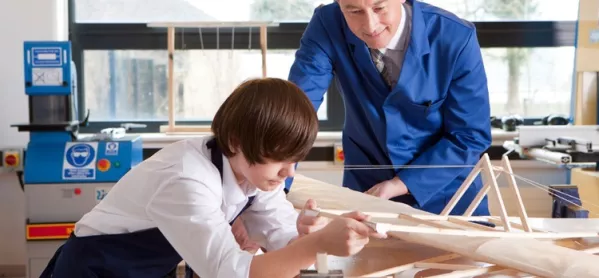The education White Paper is a significant document, which lays out the government’s intentions for the future for our schools. But I wonder how many parents - or, indeed, fellow education professionals - have managed to get beyond the headlines in the busy lead-in to the Easter break and exam season.
There has been much hue and cry about absence from manifestos, enforced academisation, reducing the role of parents on governing boards, and encouraging a longer school day. In reality, there’s a lot that consolidates changes that have been underway for a while. Cast in that light, they are therefore not radical reforms. But, however we stomach this, it is the laying out that the government intends as a new normal.
Watching, not making
From my perspective as chair of A New Direction, there are some positive signals here regarding cultural education: a clear endorsement of its importance in general terms and some emphasis on the freedoms and flexibilities to implement a broad curriculum and character education.
However, I see nothing that will really counter the claim that this government is only interested in a particular model of cultural education - one that talks about art (watching, we assume), not creativity (thinking making, doing), and Shakespeare not Sarah Kane, nor anybody either alive and kicking (or only recently dead).
Winners and losers
There will be winners and losers in the move towards ever-greater school autonomy. There is scope for entrepreneurism, with all its positive connotations for innovation and growth, alongside its much-discussed negative implications: self-interest, privatisation, disposal of public assets, individuality, lack of external challenge, chaos.
For non-education specialists hoping for insight into how best to work with schools when local authorities may no longer provide a route in, there is another language to learn: NLEs, SLEs, MATs, for instance.
Forced academisation - read by many as the response to too few schools falling over themselves to convert and needing a coercive hand - will privilege organisations and partners (commercial and non-commercial) with resources to navigate the new terrain. It will also, surely, benefit more open and externally focused schools, which have always tended to be the best schools in our system. I am left worrying not about the schools with poor results on the political and inspection radar, but the middle-ranking, pressed, competent schools who will struggle to attract resources and thrive.
The question is, with many of the more traumatic reforms of recent years (new accountability systems, academisation, and new models of school improvement) increasingly embedded, how do we - collectively, please, not as “devil take the hindmost” individualists - scale up and share innovative solutions to the challenges to education that will inevitably remain?
Scorn
I see these things already under discussion, with many school leaders rolling up their sleeves and suggesting solutions together. But has the wider world caught up? Can we help it to do so?
Have you read the scorn heaped by Mumsnet upon the guest posting by the secretary of state? Not everybody has bought into the policy. Two petitions to parliament have crossed the 100,000 signature mark. Not everybody will simply let it be. Autonomy, surely, means system-wide, system-owned, collaborative empowerment. It isn’t about us, or ministers either. It’s about the children.
The Arts Council’s cultural education challenge stressed the need for innovation and partnership-based, local solutions. It is prescient in its thinking, and applicable to far more than arts education. But how will it, and thinking like it, gain traction during wearyingly determined structural change, rather than hearts-and-minds change?
The new normal
If this is the new normal, we who care deeply about rounded, truly learner-centric education have in our hands - and need to use - as many ways as possible to ensure the freedoms trumpeted for so long result in more and better provision, not retrenchment and lowest-common-denominator solutions.
With autonomy and freedom comes the rejuvenation of philosophy, culture and vocation. Which - as wiser people than me have often pointed out - should eat “just give us structural answers” and spit out the bones.
Professor Maggie Atkinson is Chair of A New Direction, London’s flagship cultural education agency. She is a management consultant at iMPOWER, and former Children’s Commissioner for England.
Want to keep up with the latest education news and opinion? Follow TES on Twitter and like TES on Facebook




